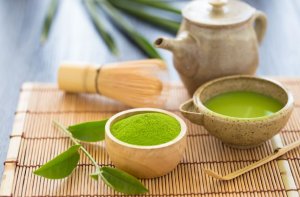Matcha Tea and its Benefits

Matcha tea comes from ground green tea. Manufacturers produce the tea by steaming it, then grinding it into a very fine powder. It’s then stored in a dark area without oxygen. This process conserves it in perfect conditions so that it doesn’t lose its properties.
Matcha tea has a high number of benefits when compared to other teas. This tea is rich in vitamin A, vitamin B, vitamin C, vitamin E, vitamin K, and minerals. Additionally, it has multiple nutrients and other components with antioxidant characteristics.
Benefits of matcha tea
In the following list, we’ll talk about the multiple beneficial properties of matcha tea:
-Antioxidant power: it helps us prevent the negative effects of UV radiation. Not only that, but it has a large number of catechins, which is one of the most potent and beneficial antioxidants.
-It helps people with diabetes: this beverage reduces triglyceride levels, total cholesterol, and hepatic glucose. That’s how it helps to regulate the blood sugar of people who suffer from this disease.
-Cardiovascular diseases: it keeps levels of cholesterol low and helps to reduce the accumulation of lipids.
-It improves your gastrointestinal function: consuming matcha tea stimulates fecal excretion and helps your body eliminate noxious chemicals and toxins.

-Helps to prevent cancer: this beverage contains polyphenols, which can prevent the proliferation of malignant cancer cells, promote induction of apoptosis, and help reduce the risk of developing various types of cancer.
-Increases your metabolism: this tea helps your metabolism increase its pace significantly. That means you’ll be able to burn fat more quickly. Aside from that, being that it’s a natural drink, you’ll avoid many of the negative side effects you could suffer from other supplements.
-Detoxifies: matcha tea contains a high amount of chlorophyll and this substance is capable of naturally eliminating heavy metals and toxins from the body.
-Helps your immune system: this beverage contains catechins, which have antibiotic properties to promote your health. Additionally, just a single cup of this drink gives you substantial amounts of potassium, vitamins A and C, iron, protein, and calcium.
-Improves cholesterol: people who regularly drink matcha tea have lower levels of bad cholesterol. At the same time, they enjoy higher levels of good cholesterol. This tea also makes these people less prone to developing cardiac diseases.
Mental benefits
-Helps you relax: Despite the fact that its high caffeine content might make this sound strange to you, this tea has an amino acid in its leaves that relaxes you without making you sleepy.
-Increases your concentration: this beverage promotes the production of dopamine and serotonin, which are chemicals that improve your mood, memory, and concentration.
-Raises your energy levels: this is due to its caffeine content. Also, you won’t suffer any of the negative effects that are typical of energy drinks, such as nervousness or hypertension.
Side effects of matcha tea
Just like any food or drink that we consume on a daily basis, matcha tea also has some negative points.
-If you’re taking medication, leave at least two hours between the time you take it and the time you drink matcha so that they don’t interfere or contradict each other.
-If you have a sensitive stomach or stomach problems, it’s best for you not to drink this tea. This is because its high caffeine content may aggravate certain conditions.
-Don’t drink large amounts of this tea while you’re pregnant.

-Matcha tea comes from green tea. This tea reduces your absorption of iron, which means that if you tend to suffer from anemia, experts recommend you don’t drink it.
In closing, we’d like to say that matcha tea has more benefits than negative effects. Nevertheless, depending on the current state of your health, it’s better to ask your doctor if drinking this tea will be beneficial for you or not.
Matcha tea comes from ground green tea. Manufacturers produce the tea by steaming it, then grinding it into a very fine powder. It’s then stored in a dark area without oxygen. This process conserves it in perfect conditions so that it doesn’t lose its properties.
Matcha tea has a high number of benefits when compared to other teas. This tea is rich in vitamin A, vitamin B, vitamin C, vitamin E, vitamin K, and minerals. Additionally, it has multiple nutrients and other components with antioxidant characteristics.
Benefits of matcha tea
In the following list, we’ll talk about the multiple beneficial properties of matcha tea:
-Antioxidant power: it helps us prevent the negative effects of UV radiation. Not only that, but it has a large number of catechins, which is one of the most potent and beneficial antioxidants.
-It helps people with diabetes: this beverage reduces triglyceride levels, total cholesterol, and hepatic glucose. That’s how it helps to regulate the blood sugar of people who suffer from this disease.
-Cardiovascular diseases: it keeps levels of cholesterol low and helps to reduce the accumulation of lipids.
-It improves your gastrointestinal function: consuming matcha tea stimulates fecal excretion and helps your body eliminate noxious chemicals and toxins.

-Helps to prevent cancer: this beverage contains polyphenols, which can prevent the proliferation of malignant cancer cells, promote induction of apoptosis, and help reduce the risk of developing various types of cancer.
-Increases your metabolism: this tea helps your metabolism increase its pace significantly. That means you’ll be able to burn fat more quickly. Aside from that, being that it’s a natural drink, you’ll avoid many of the negative side effects you could suffer from other supplements.
-Detoxifies: matcha tea contains a high amount of chlorophyll and this substance is capable of naturally eliminating heavy metals and toxins from the body.
-Helps your immune system: this beverage contains catechins, which have antibiotic properties to promote your health. Additionally, just a single cup of this drink gives you substantial amounts of potassium, vitamins A and C, iron, protein, and calcium.
-Improves cholesterol: people who regularly drink matcha tea have lower levels of bad cholesterol. At the same time, they enjoy higher levels of good cholesterol. This tea also makes these people less prone to developing cardiac diseases.
Mental benefits
-Helps you relax: Despite the fact that its high caffeine content might make this sound strange to you, this tea has an amino acid in its leaves that relaxes you without making you sleepy.
-Increases your concentration: this beverage promotes the production of dopamine and serotonin, which are chemicals that improve your mood, memory, and concentration.
-Raises your energy levels: this is due to its caffeine content. Also, you won’t suffer any of the negative effects that are typical of energy drinks, such as nervousness or hypertension.
Side effects of matcha tea
Just like any food or drink that we consume on a daily basis, matcha tea also has some negative points.
-If you’re taking medication, leave at least two hours between the time you take it and the time you drink matcha so that they don’t interfere or contradict each other.
-If you have a sensitive stomach or stomach problems, it’s best for you not to drink this tea. This is because its high caffeine content may aggravate certain conditions.
-Don’t drink large amounts of this tea while you’re pregnant.

-Matcha tea comes from green tea. This tea reduces your absorption of iron, which means that if you tend to suffer from anemia, experts recommend you don’t drink it.
In closing, we’d like to say that matcha tea has more benefits than negative effects. Nevertheless, depending on the current state of your health, it’s better to ask your doctor if drinking this tea will be beneficial for you or not.
All cited sources were thoroughly reviewed by our team to ensure their quality, reliability, currency, and validity. The bibliography of this article was considered reliable and of academic or scientific accuracy.
- Bonuccelli, G., Sotgia, F., & Lisanti, M. P. (2018). Matcha green tea (MGT) inhibits the propagation of cancer stem cells (CSCs), by targeting mitochondrial metabolism, glycolysis and multiple cell signalling pathways. Aging, 10(8), 1867–1883. https://doi.org/10.18632/aging.101483
- Bressel Larrú, C. (2020). Análisis crítico sobre los “supuestos” beneficios de los superalimentos. Universidad Autónoma de Madrid.
- González-Londoño, Sofía & Mora-Flórez, Juan-José & Viana-Viana, María-Isabel & Moreno, Freddy. (2022). Té matcha: Mecanismos moleculares y disminución de riesgo cardiovascular. Una revisión de la literatura.. 8. 58-65.
- Yang, T. T., & Koo, M. W. (2000). Chinese green tea lowers cholesterol level through an increase in fecal lipid excretion. Life Sciences, 66(5), 411–423. https://doi.org/10.1016/s0024-3205(99)00607-
This text is provided for informational purposes only and does not replace consultation with a professional. If in doubt, consult your specialist.








